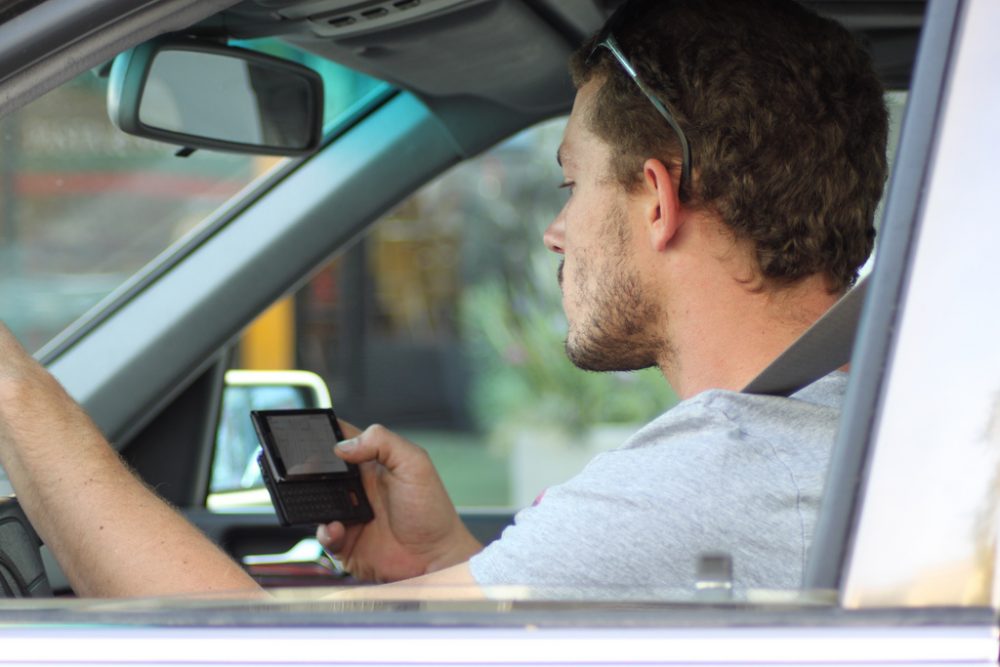Advertisement
Parents, Hold The Phone: Study Finds Teens Talk To You While Driving

Veronica Thomas
CommonHealth Intern
To prevent distracted driving, parents can get mobile apps that track their teen's every driving behavior, from speeding to texting friends. But what happens when parents themselves are steering kids in the wrong direction?
More than half of teens are actually talking with their parents when they're using their cellphones behind the wheel, according to a new study presented at this week's American Psychological Association's annual convention.
Car crashes are the leading cause of death among teens, and distracted driving is often to blame, causing 10 percent of fatal crashes. Nearly all teens admit to using a cellphone while driving, but they're not the only group of drivers who try multi-tasking while operating a two-ton machine.
Studies have found that parents use their cellphones while driving just as much as their kids. Just as in the "Like Father, Like Son" anti-smoking PSA from the '60s, mom and dad are modeling a driving behavior that at least quadruples the risk of crashing.
This new study, led by Parallel Consulting, finds that parents also promote distracted driving by calling and texting their kids to check in or catch up.
The researchers asked more than 400 teen drivers why they continue to talk and text while driving despite clear warnings of the risk.
Every teen in the study who reported talking on the phone while behind the wheel said they talked to their parents, while only 20 percent talked to friends.
Texting was a different story: The study found that teens are much more likely to text their friends, with only 16 percent of older teens and 8 percent of younger teens texting their parents while driving.
One of the investigators, Dr. Noelle LaVoie, elaborated on the findings in the American Psychological Association's press release:
"Teens said parents expect to be able to reach them, that parents get mad if they don't answer their phone and they have to tell parents where they are," said Noelle LaVoie, PhD, a cognitive psychologist based in Petaluma, California. The teens also said that their parents use cellphones while driving and that "everyone is doing it," according to the research, which was funded by the National Institutes of Health.
"Parents need to understand that this is not safe and emphasize to their children that it's not normal or acceptable behavior," said LaVoie. "Ask the question, 'Are you driving?' If they are, tell them to call you back or to find a spot to pull over so they can talk.
So if parents can't check in with their teens while they're driving, how else can they make sure their kids are safe?
There are apps that allow parents to keep tabs on teen drivers without simultaneously distracting them. In addition to monitoring driving behaviors, several apps on the market can track the car itself and auto-respond to incoming texts and calls with a message like, "I'm driving. I'll respond later."
Some of these apps can even disable the phone completely when the car reaches a certain speed, preventing any communication except emergency phone calls to pre-set numbers, like 911.
"Innovative technologies like mobile apps can help parents ensure their teens are driving safely without contributing to the problem of cellphone use while driving," says Jay A. Winsten, an associate dean at the Harvard School of Public Health who is working on a distracted driving campaign.
"But parent and teen communication is only part of the larger issue of distracted driving," he says. "This study also underscores the tough challenge that lies ahead to stigmatize distracted driving and render it socially unacceptable. Changing social norms will require a combination of increasingly tough laws, strict regulation, and persuasive communication to break through people's willful denial of the risks involved."
Readers, thoughts? What will it take?